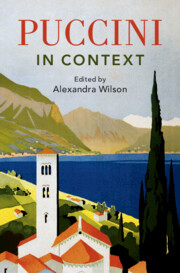Book contents
- Puccini in Context
- Composers in Context
- Puccini in Context
- Copyright page
- Contents
- Figures
- Table
- Notes on Contributors
- Preface
- Part I Formative Influences
- Part II Puccini’s Places
- Part III Influences and Interests
- Chapter 9 Musical Influences, Parallels, and Borrowings
- Chapter 10 Italian Literature of Puccini’s Day
- Chapter 11 Drama and Acting in Puccini’s Italy
- Chapter 12 Puccini and Early Film
- Chapter 13 Puccini and Technology
- Part IV Bringing Puccini to the Stage
- Part V Image and Reputation
- Part VI Puccini through a Political Lens
- Part VII Interpreting Puccini
- Part VIII Legacy
- Bibliography
- Index
Chapter 9 - Musical Influences, Parallels, and Borrowings
from Part III - Influences and Interests
Published online by Cambridge University Press: 31 August 2023
- Puccini in Context
- Composers in Context
- Puccini in Context
- Copyright page
- Contents
- Figures
- Table
- Notes on Contributors
- Preface
- Part I Formative Influences
- Part II Puccini’s Places
- Part III Influences and Interests
- Chapter 9 Musical Influences, Parallels, and Borrowings
- Chapter 10 Italian Literature of Puccini’s Day
- Chapter 11 Drama and Acting in Puccini’s Italy
- Chapter 12 Puccini and Early Film
- Chapter 13 Puccini and Technology
- Part IV Bringing Puccini to the Stage
- Part V Image and Reputation
- Part VI Puccini through a Political Lens
- Part VII Interpreting Puccini
- Part VIII Legacy
- Bibliography
- Index
Summary
This chapter examines Puccini’s relationship with the international musical scene of his day and considers the influence of contemporary progressive musical developments on his own musical style. The author considers Puccini’s attitude towards the music of Giuseppe Verdi, Richard Wagner, Georges Bizet, Jules Massenet, Claude Debussy, Richard Strauss, Igor Stravinsky, and others. He pinpoints where techniques borrowed from these figures can be found at specific moments in Puccini’s scores. In some cases, Puccini imitated aspects of plot or characterisation; in others he borrowed specific musical devices. The chapter concludes with a discussion of the ways in which Puccini drew inspiration for his operas from a variety of different national musical styles: Japanese music for Madama Butterfly, Chinese for Turandot, and American music of various types for La fanciulla del West.
- Type
- Chapter
- Information
- Puccini in Context , pp. 73 - 80Publisher: Cambridge University PressPrint publication year: 2023

